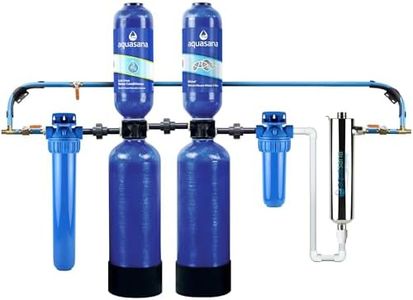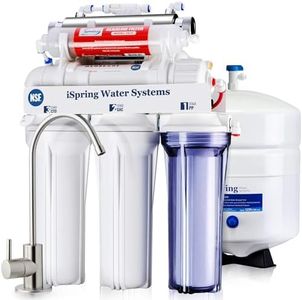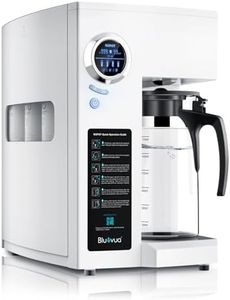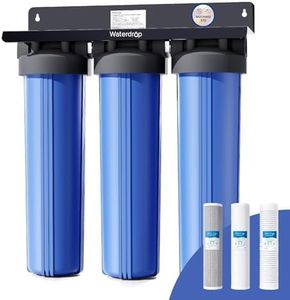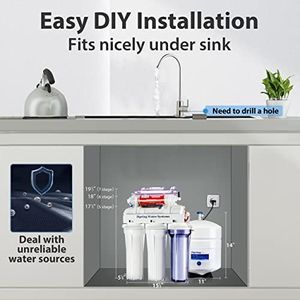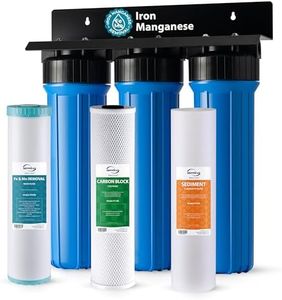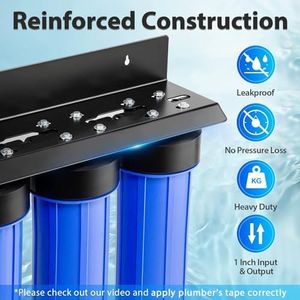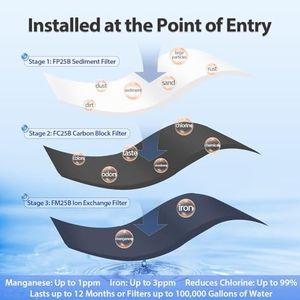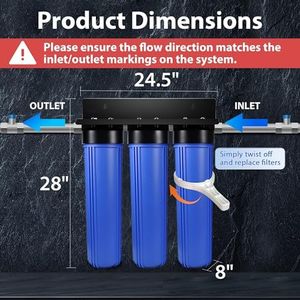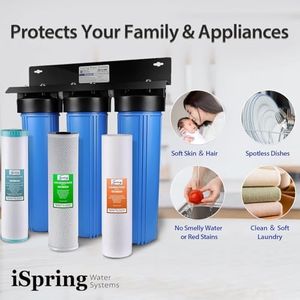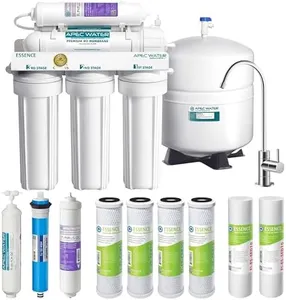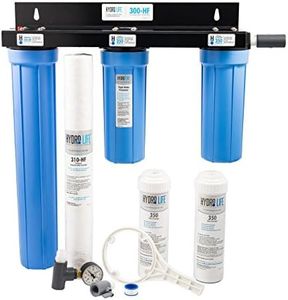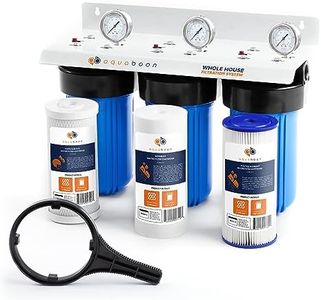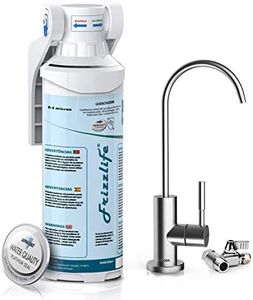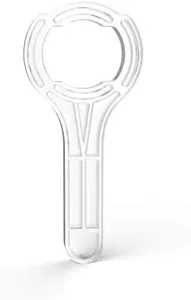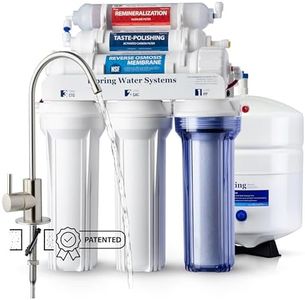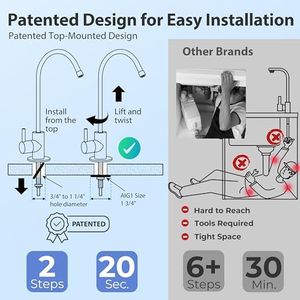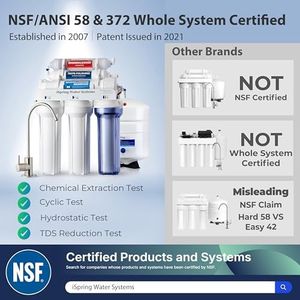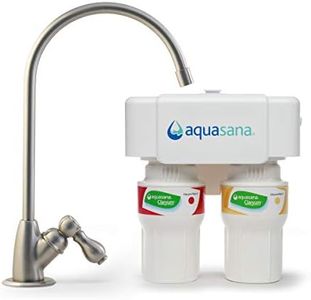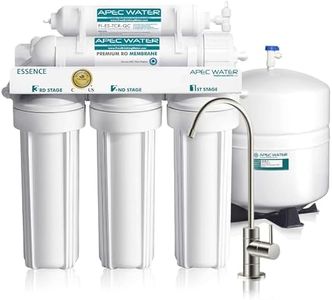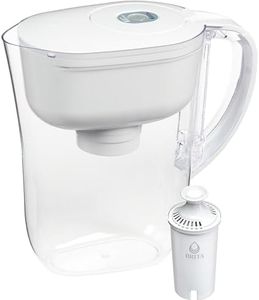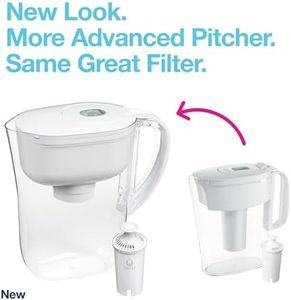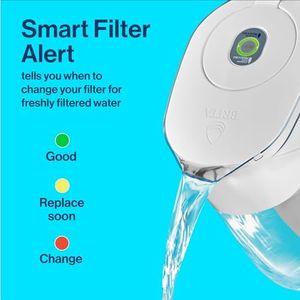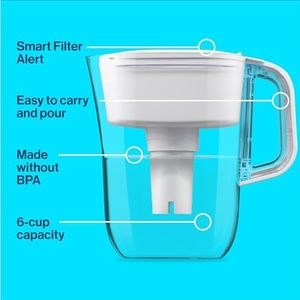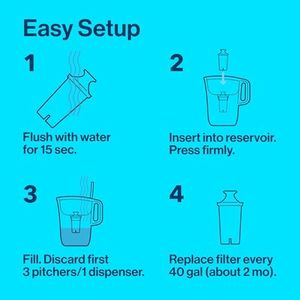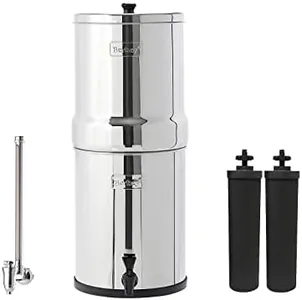10 Best Water Filter Systems 2025 in the United States
Winner
Aquasana Whole House Water Filter System | 1,000,000 Gallons | Salt-Free Softener Alternative | UV, Carbon & KDF | Tackles up to 99.99% Chlorine, Bacteria, Viruses, Cysts & Scale | EQ-1000-AST-UV
The Aquasana Whole House Water Filter System is designed to provide clean and great-tasting water throughout your home, effectively removing 97% of chlorine along with sediment, pesticides, and VOCs, thanks to a combination of carbon, KDF filtration media, and a UV purifier. The salt-free descaler technology is an added benefit for those looking to minimize scale buildup without the hassle of salt bags and electricity, although it's important to note that it does not soften water or remove the minerals responsible for hardness.
Most important from
594 reviews
iSpring RCC7AK-UV, NSF Certified, 7-Stage Under Sink Reverse Osmosis Water Filtration System with Alkaline Remineralization and UV Filter, Patented Top-Mounted Faucet Design for Easy Installation
The iSpring RCC7AK-UV is a comprehensive under-sink water filtration system that uses a 7-stage reverse osmosis process combined with alkaline remineralization and a UV filter. This means it effectively removes a wide range of contaminants—over 1,000 types including lead, chlorine, fluoride, and harmful microbes thanks to the UV light stage. The UV filter automatically activates when water flows, which helps save energy and extends the life of the UV lamp. After filtration, the system adds back healthy minerals to improve taste and maintain a natural pH balance, a feature often missing in basic RO systems.
Most important from
1756 reviews
Bluevua RO100ROPOT-UV Reverse Osmosis System Countertop Water Filter - 6 Stage Purification with UV and Remineralization, Counter RO Filtration, Portable Water Purifier
The Bluevua RO100ROPOT-UV Reverse Osmosis System is a versatile countertop water filter ideal for households seeking high-quality water purification without the need for complex installation. Its standout feature is the 6-stage filtration process, incorporating a RO membrane with UV light and a remineralization filter. This advanced system effectively reduces contaminants like chlorine, arsenic, and lead, while enhancing the water with essential minerals for improved taste and health benefits. It's certified lead-free, adding an extra layer of assurance for safety.
Most important from
4348 reviews
Top 10 Best Water Filter Systems 2025 in the United States
Winner
Aquasana Whole House Water Filter System | 1,000,000 Gallons | Salt-Free Softener Alternative | UV, Carbon & KDF | Tackles up to 99.99% Chlorine, Bacteria, Viruses, Cysts & Scale | EQ-1000-AST-UV
Aquasana Whole House Water Filter System | 1,000,000 Gallons | Salt-Free Softener Alternative | UV, Carbon & KDF | Tackles up to 99.99% Chlorine, Bacteria, Viruses, Cysts & Scale | EQ-1000-AST-UV
Chosen by 1314 this week
iSpring RCC7AK-UV, NSF Certified, 7-Stage Under Sink Reverse Osmosis Water Filtration System with Alkaline Remineralization and UV Filter, Patented Top-Mounted Faucet Design for Easy Installation
iSpring RCC7AK-UV, NSF Certified, 7-Stage Under Sink Reverse Osmosis Water Filtration System with Alkaline Remineralization and UV Filter, Patented Top-Mounted Faucet Design for Easy Installation
Bluevua RO100ROPOT-UV Reverse Osmosis System Countertop Water Filter - 6 Stage Purification with UV and Remineralization, Counter RO Filtration, Portable Water Purifier
Bluevua RO100ROPOT-UV Reverse Osmosis System Countertop Water Filter - 6 Stage Purification with UV and Remineralization, Counter RO Filtration, Portable Water Purifier
iSpring Whole House Water Filter System, Reduces Iron, Manganese, Chlorine, Sediment, Taste, and Odor, 3-Stage Iron Filter Whole House, Model: WGB32BM
iSpring Whole House Water Filter System, Reduces Iron, Manganese, Chlorine, Sediment, Taste, and Odor, 3-Stage Iron Filter Whole House, Model: WGB32BM
APEC Water Systems ROES-PH75 Essence Series Top Tier Alkaline Mineral pH+ 75 GPD 6-Stage Certified Ultra Safe Reverse Osmosis Drinking Water Filter System with Extra High Capacity Filter Set Stage 1-3
APEC Water Systems ROES-PH75 Essence Series Top Tier Alkaline Mineral pH+ 75 GPD 6-Stage Certified Ultra Safe Reverse Osmosis Drinking Water Filter System with Extra High Capacity Filter Set Stage 1-3
iSpring RCC7AK, NSF Certified, 75 GPD, Alkaline 6-Stage Reverse Osmosis System, pH+ Remineralization RO Water Filter System Under Sink, Patented Top-Mounted Faucet Design for Easy Installation
iSpring RCC7AK, NSF Certified, 75 GPD, Alkaline 6-Stage Reverse Osmosis System, pH+ Remineralization RO Water Filter System Under Sink, Patented Top-Mounted Faucet Design for Easy Installation
Aquasana Under Sink Water Filter System - Reduces PFAS, Lead, & Chlorine in Drinking Water - Under Counter Claryum Filtration for Kitchen - 2-Stage - Brushed Nickel Faucet - AQ-5200.55
Aquasana Under Sink Water Filter System - Reduces PFAS, Lead, & Chlorine in Drinking Water - Under Counter Claryum Filtration for Kitchen - 2-Stage - Brushed Nickel Faucet - AQ-5200.55
APEC Water Systems ROES-50 Reverse Osmosis Water Filter Essence Series Top Tier 5-Stage WQA Certified Ultra Safe Reverse Osmosis System
APEC Water Systems ROES-50 Reverse Osmosis Water Filter Essence Series Top Tier 5-Stage WQA Certified Ultra Safe Reverse Osmosis System
Brita Water Filter Pitcher for Tap and Drinking Water with 1 Standard Filter, Lasts 2 Months, 6-Cup Capacity, BPA Free, White
Brita Water Filter Pitcher for Tap and Drinking Water with 1 Standard Filter, Lasts 2 Months, 6-Cup Capacity, BPA Free, White
Royal Berkey Gravity-Fed Water Filter System with 2 Black Berkey Elements Plus Deluxe 10" Stainless Steel Berkey Water View Spigot
Royal Berkey Gravity-Fed Water Filter System with 2 Black Berkey Elements Plus Deluxe 10" Stainless Steel Berkey Water View Spigot
Our technology thoroughly searches through the online shopping world, reviewing hundreds of sites. We then process and analyze this information, updating in real-time to bring you the latest top-rated products. This way, you always get the best and most current options available.

